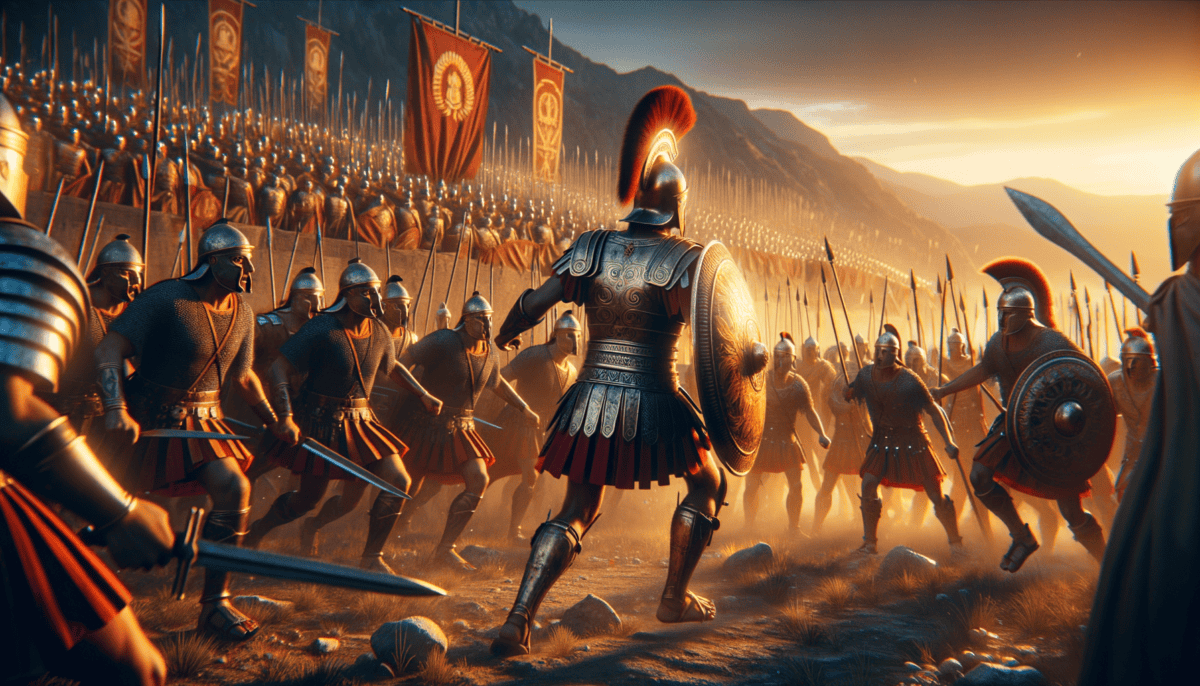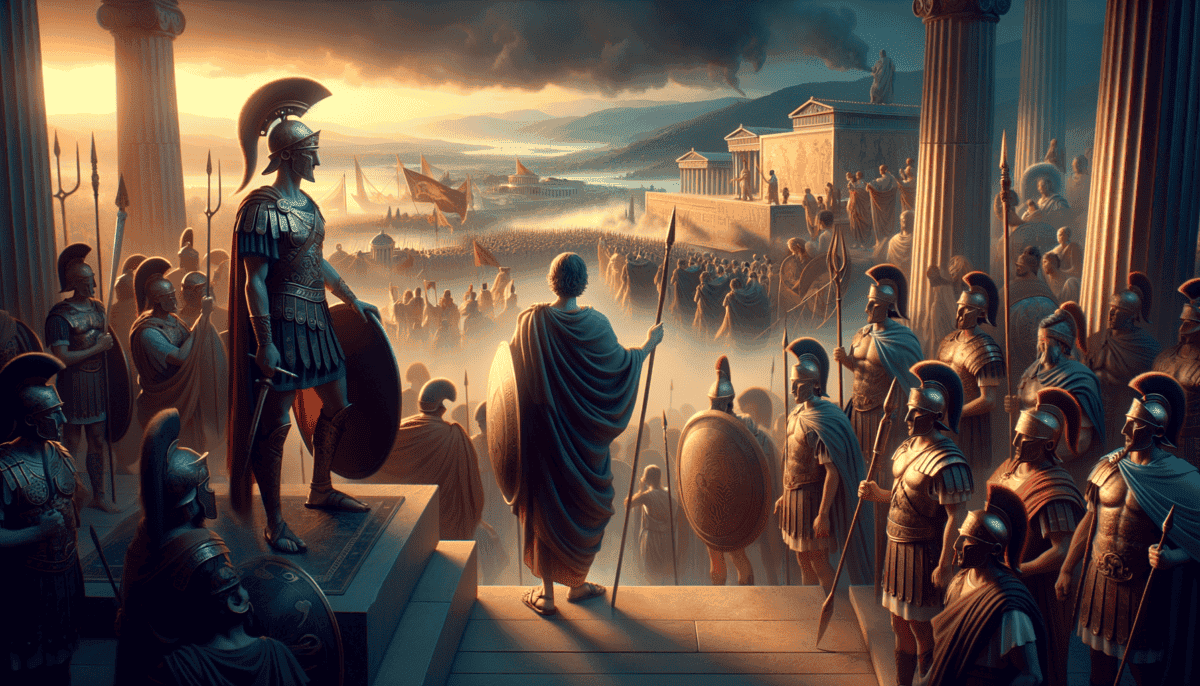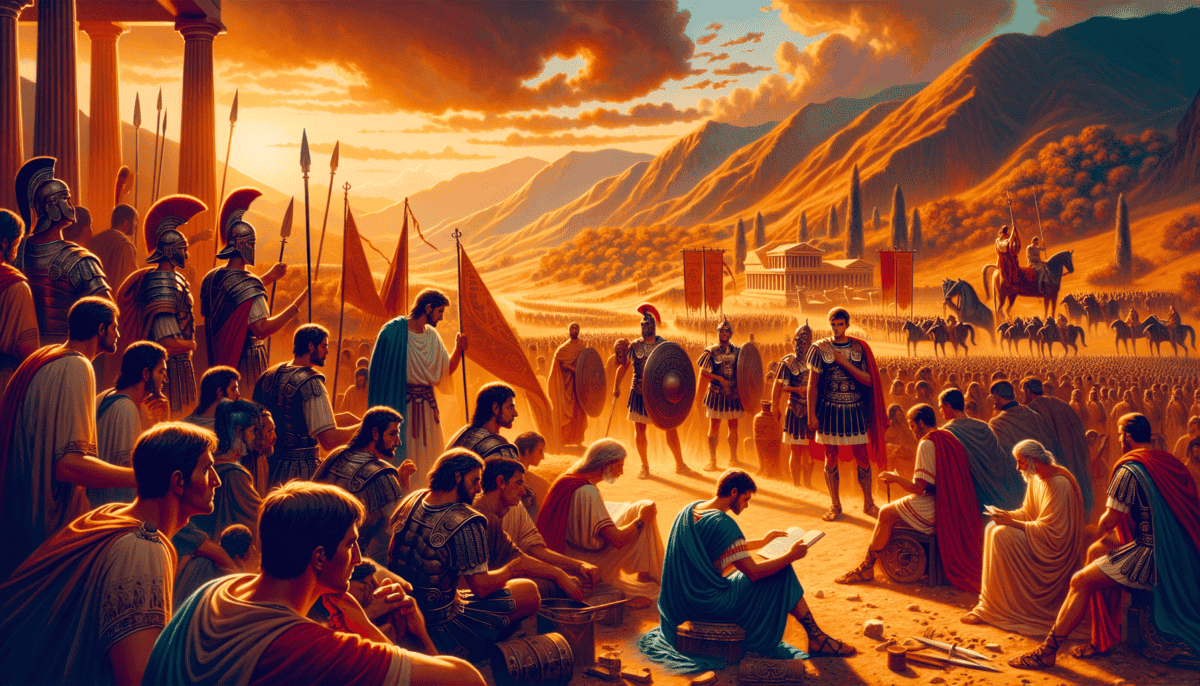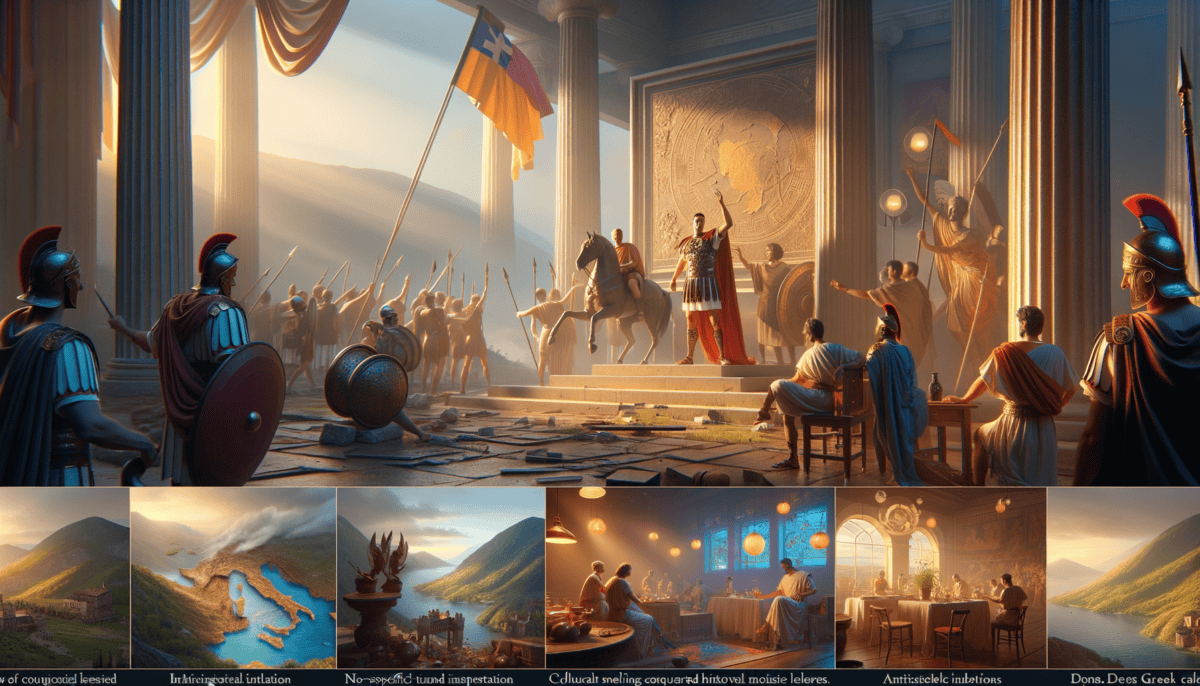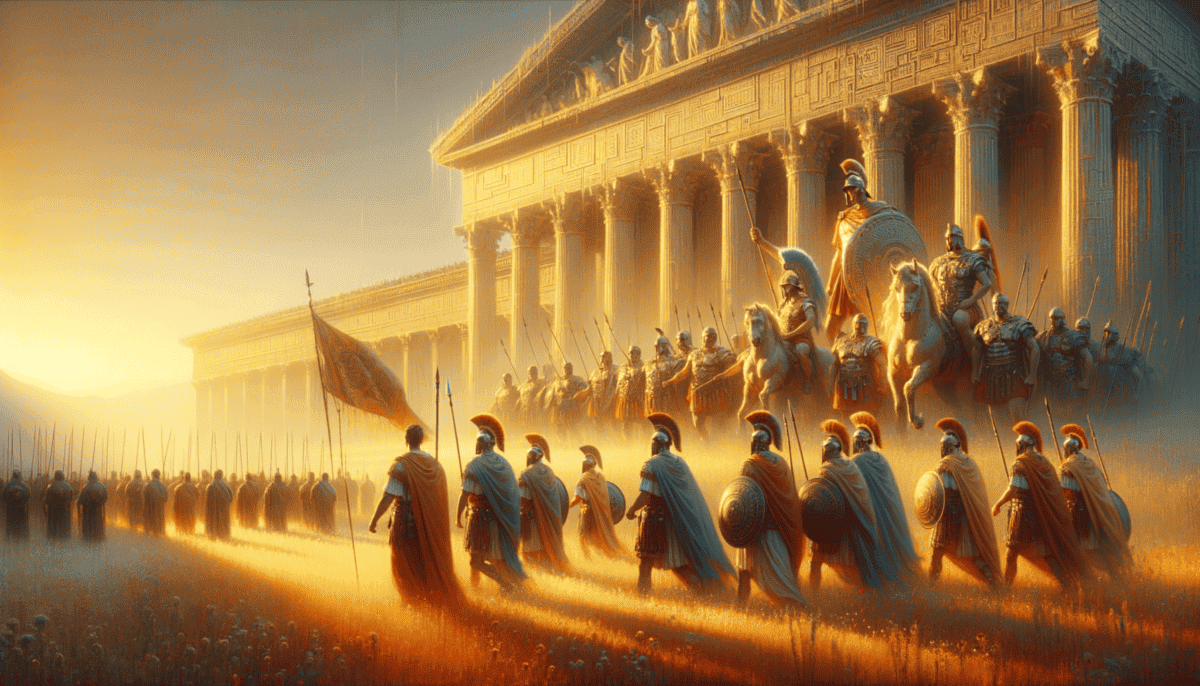The Gathering Storm
The warm Mediterranean sun sparkled on the blue waters as ships bobbed in the harbor of Athens. It was a busy day in 150 BCE, and young Alexandros watched the boats come and go with his father, Nikias, a merchant who traded olive oil.
"Papa, why do the ships look different now?" Alexandros asked, pointing to vessels with strange red sails.
"Those are Roman ships, my boy," Nikias replied with a worried look. "We see more of them each day."
A Changed World
The Greek world was changing fast. Where once Greek ships ruled the seas, now Roman vessels filled the harbors. The proud Greek cities that had stood strong for hundreds of years were not as mighty as before.
"But aren't we Greeks the strongest?" Alexandros asked, remembering the stories his grandmother told about brave Greek heroes.
Nikias patted his son's head. "We were once. But now our cities fight each other instead of standing together. And Rome grows stronger every day."
Signs of Trouble
In the marketplace, Alexandros and his father heard people talking about Rome. Some spoke in scared whispers, while others shouted angry words.
"The Romans are coming closer!" warned an old sailor. "They already control Sicily and parts of Macedonia."
A group of merchants gathered around to listen. Some looked scared, others angry.
"What can we do?" asked one.
"We must unite!" said another.
But uniting wasn't easy. The Greek cities had been fighting each other for too long. They were like children who couldn't stop arguing long enough to see the bigger problem.
The Warning Signs
• Things were changing in Greece:
- Roman ships filled the harbors
- Greek cities fought each other
- People were scared of Rome's power
- Old alliances were breaking
A Father’s Wisdom
That evening, as they walked home along the stone streets of Athens, Alexandros had more questions.
"Papa, why don't our cities work together anymore?"
Nikias stopped and looked at the setting sun. "It's like your cousins, little one. Remember how they fought over grandmother's special honey cakes last festival?"
Alexandros nodded.
"Well, our cities are like that. They fight over land, money, and power. They forget that family should stick together."
The sun set over the Acropolis, painting the sky in shades of orange and purple. As darkness fell, torches began to light up across Athens, like stars coming out one by one.
Night Falls on Greece
From their house on the hill, Alexandros could see the whole city. The marble temples glowed in the moonlight. But something felt different now.
"Will things change, Papa?"
"Yes, my son. Big changes are coming. Like a storm gathering on the horizon."
That night, as Alexandros lay in bed, he could hear the adults talking in worried voices. Something was happening to his world. The mighty Greek cities that had stood proud for so long were starting to crack.
“When the wind changes, even the strongest trees must bend or break.” – Old Greek saying
The stars twinkled over Athens, just as they had for hundreds of years. But now they watched over a changed world. The great Greek cities were divided, while Rome grew stronger each day.
Like a gathering storm, change was coming to Greece. And no one, not even the wisest old men in Athens, knew what tomorrow would bring.
As Alexandros drifted off to sleep, he dreamed of ships with red sails, of arguing cousins, and of storms gathering on distant horizons. The world he knew was changing, and the greatest changes were still to come.
Macedonia’s Last Stand
The thunder of marching feet shook the ground as King Perseus of Macedonia watched from a hilltop. Below, his army prepared for the biggest fight of their lives. The year was 168 BCE, and the Romans were coming. ️
“My king,” said General Demetrios, “the Roman legions approach from the south.”
The Battle Begins
The morning sun glinted off thousands of bronze shields and spear tips. The Macedonian army looked strong, just like in the days of Alexander the Great. But times had changed.
“Look how our spears shine!” said a young soldier named Theron. “We will win for sure!”
The older soldiers weren’t so sure. They had heard stories about how strong the Romans were.
The Roman Way
The Roman army was different. Instead of long spears, they used short swords and big shields. They could move faster and fight in rough places where the Macedonian phalanx got stuck.
“They fight like wolves,” whispered an old warrior. “Quick and hungry.”
The ground trembled as thousands of feet marched forward. The great battle was about to begin!
The Clash
The armies met at a place called Pydna. The noise was like thunder:
- Shields crashed together
- Swords clanged against spears
- Men shouted battle cries
- Trumpets blared signals
At first, the Macedonians pushed forward. Their wall of spears seemed unstoppable. King Perseus smiled, thinking of victory.
“Stand firm, sons of Macedonia! Today we fight for our homes!” – King Perseus
Everything Changes
But then something went wrong. The ground was bumpy, with rocks and small hills. The perfect Macedonian formation started to break apart.
“Close the gaps!” shouted General Demetrios. But it was too late. The Roman soldiers slipped through the breaks in the formation.
The Fall
Young Theron watched in horror as the mighty Macedonian army began to crumble. The Romans were everywhere, their short swords flashing in the sun.
“This cannot be happening,” King Perseus whispered. But it was.
The sun set on a changed world. Macedonia, once the proudest kingdom in Greece, had fallen to Rome.
After the Battle
King Perseus tried to run away, but the Romans caught him. They took him to Rome as a prisoner. Macedonia, the land of Alexander the Great, became a Roman province.
That night, around campfires, the survivors told stories of the battle. Some cried for their fallen friends. Others wondered what would happen next.
“Will they come for the rest of Greece?” asked a soldier.
An old warrior looked at the stars and said, “They already are.”
The defeat at Pydna was more than just a lost battle. It showed that the old ways of fighting weren’t working anymore. The Romans were bringing new ideas, new ways of fighting, and soon they would bring big changes to all of Greece.
As the stars came out over the battlefield, the world had changed forever. The great kingdom of Macedonia was gone, and Rome’s shadow grew longer over all of Greece.
The Siege of Corinth
The sun rose over Corinth, painting the sky pink and gold. The beautiful city sat between two seas, with tall walls and proud temples. But today was different. Roman soldiers surrounded the city. ️
“They’re everywhere,” whispered Maya, a young girl watching from the city walls with her father, a defender of Corinth.
The City Prepares
Inside Corinth, people rushed to get ready. Some stored food, others fixed the walls. The smell of fresh bread mixed with the sharp scent of metal as soldiers sharpened their swords.
“Will the Romans really attack us, Papa?” Maya asked.
“They want our city,” her father said softly. “But we will protect our home.”
The Roman Camp
Outside the walls, Roman General Lucius Mummius walked through his camp. He looked at Corinth’s strong walls and smiled.
“Time and hunger are our best weapons,” he told his officers. “We will wait until they are weak.”
Life Under Siege
Days turned into weeks. Inside Corinth:
- Food became harder to find
- Water was carefully saved
- Children couldn’t play in the streets
- People grew tired and scared
The city felt like a cage, with Romans waiting outside like hungry lions.
Stories and Songs
At night, people gathered to tell stories about brave Greek heroes. Maya’s grandmother sang old songs about freedom.
“Our walls are strong, our hearts are stronger!” – The people’s favorite song
The Final Battle
One dark morning, everything changed. The Romans brought huge machines to break the walls. The noise was terrible:
BOOM! BOOM! The walls shook. Dust filled the air.
“Hold the walls!” shouted the defenders. But the Romans were too strong.
The City Falls
When the walls broke, Maya’s father helped his family hide in a temple. The Romans poured into the city like a flood.
“Close your eyes,” Maya’s mother whispered. “It will be over soon.”
The proud city of Corinth, queen of two seas, fell to Rome in 146 BCE.
A New Beginning
The Romans were harsh with Corinth. They took many treasures and burned parts of the city. But they also brought new things:
Years later, Maya grew up and had children of her own. She told them stories about the old Corinth, but also about how the city grew strong again under Roman rule.
“The city changed,” she would say, “but our stories and memories live on.”
The fall of Corinth marked the end of Greek freedom. But the Greeks found new ways to keep their culture alive, even as part of the Roman world.
As the sun set over the new Roman Corinth, Greek children still played in its streets, and Greek songs still floated on the evening breeze. The city was different now, but its heart was still beating.
Brave Hearts Never Die
The marketplace in Athens buzzed with worried whispers. News of Corinth’s fall spread like wildfire through Greece. People gathered in small groups, sharing stories of resistance. ️
The Philosopher’s Stand
Old Demetrius stood in the shade of an olive tree. His white beard and wise eyes drew people close to hear him speak.
“They may take our cities,” he said, “but they cannot take our minds or our stories.”
The Young Rebel
Theron, a young potter, worked clay between his fingers. He made beautiful vases with pictures of Greek heroes.
“Each pot tells our story,” he said proudly. “The Romans can’t stop that.”
His latest work showed brave Greek soldiers defending their homes:
- Heroes fighting for freedom
- Children learning from teachers
- Athletes in the games
- Farmers tending olive trees
The Secret School
In a small house, Helena taught Greek children their letters. The Romans didn’t mind this, but she also taught them something more important.
“Remember who you are,” she whispered. “You are the children of heroes.”
The Farmer’s Choice
Outside the city, old Stephanos worked his olive grove. A Roman official visited him.
“Your olives are the best,” the Roman said. “Teach our farmers your methods.”
Stephanos smiled. By sharing his knowledge, he could keep Greek farming alive.
The Storyteller
As night fell, children gathered around Marina, the storyteller. Her eyes sparkled in the firelight.
“Let me tell you about brave Leonidas,” she began. The children leaned forward, excited.
Through stories, Greek heroes lived forever in young hearts.
The Artist’s Way
Young Lyra painted beautiful pictures on walls. She mixed Greek and Roman styles:
“See?” she told her little brother. “We can make something new and still be Greek.”
Standing Together
In the evening, people gathered in the square. Someone started playing a lyre. Others joined in singing old Greek songs.
A Roman soldier stopped to listen. He smiled and nodded his head to the music.
Maybe, thought Demetrius, watching from his doorway, this is how we win after all.
The Next Morning
The sun rose over Athens. The city looked different now with Roman guards and new buildings. But Greek life went on:
Children still played ancient games in the streets. Mothers still told old stories at bedtime. Teachers still taught Greek wisdom in quiet corners.
The spirit of Greece lived on in every heart, in every song, in every story told around evening fires. The Greeks found their own way to keep fighting – not with swords, but with words, art, and wisdom.
As Demetrius watched the sunrise, he smiled. Some battles are won not by fighting, but by remembering who you are.
When Cultures Dance
The sun sparkled on marble columns in Athens. Roman soldiers walked the streets, but something amazing was happening. Greek ideas were changing Rome!
The Roman Student
Marcus, a young Roman, sat at the feet of Teacher Demetrius. His eyes were wide with wonder.
“Tell me more about Socrates,” Marcus begged. “He asked such clever questions!”
“Knowledge is like a torch,” Demetrius smiled. “When we share it, everyone’s light grows brighter.”
The Theater Lives
In the old theater, something special was happening. Greek actors performed an ancient play. The seats were full of both Greeks and Romans.
“Look how they laugh together,” whispered Helena to her students. “Stories can build bridges.”
Art Brings People Together
Lyra’s workshop was busy. Roman families wanted paintings in the Greek style:
- Greek heroes on their walls
- Olympic athletes on their vases
- Greek patterns on their floors
- Beautiful Greek letters in their books
“Beauty speaks all languages,” Lyra said, mixing her paints.
Wisdom Shared
In the garden of a Roman house, Greek philosopher Apollodorus talked with Roman friends.
“Your ideas about justice are fascinating,” said Claudius, a Roman lawyer. “They could make our laws better.”
The Olympic Spirit
At the gymnasium, Greek athletes taught Roman youth. They shared the Olympic traditions.
“Strong body, strong mind,” said the trainer. “This is the Greek way.”
Young Romans practiced wrestling and running, proud to learn from Greek masters. ♂️
Food and Friendship
In the marketplace, wonderful smells filled the air. Greek and Roman foods mixed together.
“Try my olive bread,” called a Greek baker to passing Romans. “Made with my grandmother’s recipe!”
Building Together
Architects from both cultures worked side by side. They created new buildings that were both Greek and Roman.
“See how the columns tell both our stories?” said Theron, now a master builder. “Like old friends talking.”
The New Songs
Evening brought music to the streets. Greek lyres played while Roman flutes joined in. The songs were new but carried ancient memories.
Marina, still telling stories, had new tales to share: “Once there were two great peoples who learned to dance together…”
As stars came out, Greeks and Romans sat together in courtyards. They shared wine, stories, and dreams. The world was changing, but perhaps it was growing richer, like two streams joining to make a mighty river.
Demetrius watched it all from his favorite olive tree. “This,” he thought, “is how wisdom travels – not by conquest, but by sharing.”
And so, Greek culture flowed into Roman life like honey into tea, making something new and wonderful.
A New Dawn Rises
The Mediterranean sun painted golden stripes across the marble steps of Rome’s newest library. Inside, Greek scrolls sat next to Roman books. It was a new time – a time when two great cultures became one.
The Great Library
Little Julia ran her fingers over Greek letters carved in stone. “Grandfather, what does it say?”
“It says ‘Knowledge is Power,'” smiled Grandfather Marcus – the same Marcus who once learned from Teacher Demetrius. “Both in Greek and Latin.”
The New Teachers
In schools across Rome, children learned both languages. Greek teachers still shared their wisdom, but now they were honored guests, not conquered people.
“Tell us about Odysseus!” the children would beg. Their Roman parents smiled, remembering their own love for these tales.
Art That Lives Forever
Lyra’s daughter, Maya, now had her own art studio in Rome. She painted scenes that mixed both worlds:
- Greek gods in Roman temples
- Olympic games in Roman arenas
- Heroes from both cultures side by side
- New stories about friendship and peace
Wisdom Grows
In the Roman Senate, speakers used Greek ideas to make better laws. They remembered what Apollodorus taught them about justice and wisdom.
“We are stronger together,” said Senator Claudius, now grey-haired but still learning.
Games and Glory
The Olympic spirit lived on in Roman games. Athletes honored both Greek and Roman traditions.
“My grandfather was a Greek champion,” said one young runner proudly. “Now I run for Rome, but I carry his spirit with me.”
Stories That Last
Marina’s granddaughter, Sophia, became a famous storyteller. She told tales of how Greeks and Romans became friends.
In gardens and courtyards, old Demetrius’s words came true. Knowledge was like a torch, and now it burned brighter than ever. Greek wisdom and Roman strength had made something new and wonderful.
The stars still shone over both lands, but now they lit up one world where Greek ideas helped make Rome greater, and Rome helped keep Greek wisdom alive forever.
And so, the story of Greece didn’t end – it grew into something bigger, like a mighty tree with roots in two soils, reaching for the sky. Its branches still spread over our world today, giving us shade and wisdom, beauty and light.
Years later, Julia would tell her own children: “We are not just Romans. We carry the light of Greece in our hearts. And as long as people love wisdom and beauty, that light will never go out.” ✨


